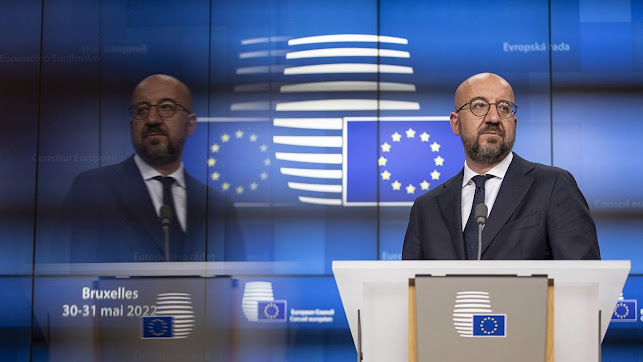Europe Can Stop Russia’s Aggression Now
Russia’s aggression in Ukraine can still be stopped without damaging the world economy. But unless the EU can get the job done properly, the world faces the risk of a prolonged and much broader conflict, in which the Russian military becomes sufficiently emboldened – or humiliated – to use nuclear weapons.
Simon Johnson
WASHINGTON, DC – Western sanctions have failed to stop Russian aggression in Ukraine twice over the past decade, once after 2014, when Russia illegally annexed Crimea and stoked violent separatism in the eastern Donbas region, and again since the invasion on February 24.
The economic policy debate has identified exactly what would be most effective: not just an oil embargo like the one the European Union just announced, but also a high tariff designed to slash the revenue Russia receives from its oil exports.
Russia can still be stopped without slowing the world economy.
But unless the EU can get the job done properly, the world faces the risk of a prolonged and much broader conflict, in which the Russian military becomes sufficiently emboldened – or humiliated – to use nuclear weapons.
The idea behind sanctions is to damage the Russian economy so much that President Vladimir Putin’s regime withdraws from Ukraine and, more broadly, abandons its aggressive expansionist policy.
Russia’s economy is based largely on the export to Europe of fossil fuels, primarily oil and natural gas.
Unfortunately, current indications are that the Europeans may again fail to deliver on policies that target the regime’s fossil-fuel revenues.
While the oil embargo that the EU has now announced will likely damage Russian revenues once it’s fully in place, oil prices may remain elevated for now, and Russia will continue to sell about the same amount, resulting in higher revenues to fund Putin’s war.
The result will be continued Russian brutality in Ukraine, where the Kremlin is clearly targeting civilians and essential infrastructure.
After Russia seized Crimea and installed puppet regimes in two breakaway Donbas regions in 2014, Western countries responded by limiting exports of military-related goods and imposing sanctions on Russian individuals.
These measures were completely ineffective, and, in retrospect, Putin seems to have perceived this slap on the wrist as permitting – if not implicitly encouraging – further aggression.
After February 24, the West responded far more severely than Putin expected, imposing sanctions on the Russian financial sector, as well as a “freeze” on the Russian central bank’s foreign-exchange reserves.
But while this had some shock value, and the ruble briefly depreciated, the central bank quickly imposed capital controls, and foreign currency continued to flow in as revenues from hydrocarbon exports held steady and natural gas prices in Europe soared.
The ruble is now stronger against the US dollar than it was before the invasion – a key psychological benchmark.
In February and March, some influential decision-makers in both the United States and the EU thought that any meaningful embargo on Russian oil would reduce world supply and push up the price.
US officials quickly recognized, however, that imposing a stiff tariff was the way to go, as this would allow Russian oil to continue flowing while squeezing the Kremlin’s revenue.
Two key features of the oil market make this a compelling approach.
First, there is a world price for oil. Russia is an important producer, but it does not set prices – these are determined by the balance of expected global demand and supply.
Second, the cost of producing oil from existing Russian wells is low – less than $10 per barrel.
This explains why, when oil prices fell to around $20 per barrel in 2020, Russia was happy to pump roughly as much oil as it does today.
At any price above $10 per barrel, Russian oil production does not increase.
The only thing that increases is the profit that Putin can use to buy weapons and other military supplies.
Given this, the smartest policy for the EU and its allies would be to form a buyers’ cartel that agrees to impose a very high tariff on Russian oil.
No one in these countries will choose Russian oil unless the price is massively reduced.
Russia will therefore try to sell more of its output to Asia, particularly China and India, whose bargaining power will increase vis-à-vis Russia, implying a bigger discount for them on purchases of Urals crude.
The cost of transporting oil from Russia to Asia is high and increasing.
And if the EU imposes restrictions on the use of its shipping, insurance, and finance for trade to any country that refuses to impose a tariff on Russian oil, the costs will rise even more.
The EU and the US should also impose a matching tariff on any purchase of refined oil products made from Russian exports, regardless of where the processing takes place.
As for Europe, the continent can buy its crude oil elsewhere.
In fact, this redirection of flows is already underway, with suppliers in Africa stepping up.
The goal of reducing Russian revenue can be achieved without reducing the flow of Russian oil into world markets if Western countries form an effective buyers’ cartel.
At this point, leading Europeans are well aware of what needs to be done.
Eventually, the EU will stop the killing by showing that it can cut off Russia’s oil revenue.
But will they do so before Russian forces in Ukraine commit even more heinous atrocities?
Simon Johnson, a former chief economist at the International Monetary Fund, is a professor at MIT's Sloan School of Management and a co-chair of the COVID-19 Policy Alliance. He is the co-author (with Jonathan Gruber) of Jump-Starting America: How Breakthrough Science Can Revive Economic Growth and the American Dream and the co-author (with James Kwak) of 13 Bankers: The Wall Street Takeover and The Next Financial Meltdown.

0 comments:
Publicar un comentario